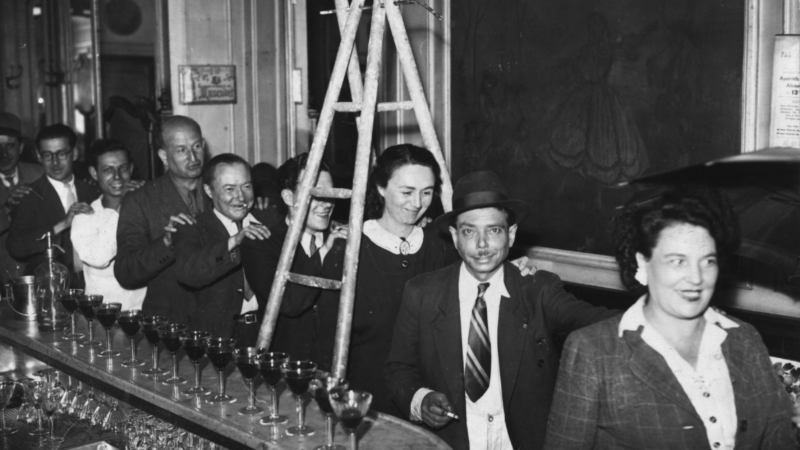The possible origins of Friday the 13th and other unlucky days
The superstition that Friday the 13th is an unlucky day has been around for the past 100 years. But it doesn’t have the ancient origins that many might expect.
It’s hard to pinpoint exactly why Friday the 13th is considered an unlucky day. Experts can only speculate.
“The United States, we get it from England… it wasn’t considered an unlucky day in England until the 20th century. The first recorded instance we have of that in print is 1913,” said Moira Marsh, a folklore librarian at the University of Indiana Bloomington.
“People start to make references to it being unlucky without saying why they think it’s unlucky. And because of that, typically what you get is all kinds of wild theories about why Friday the 13th is unlucky,” said Stephen Winick, a folklore specialist at the American Folklife Center of The Library of Congress.
Some reasons why Friday the 13th is thought to be unlucky
Some speculate that Friday the 13th is unlucky because Judas was the 13th guest at the Last Supper, or that Knights Templar were condemned on a Friday the 13th. But Winick said experts don’t know if any of those things are true.
The first references Winick has seen saying Friday the 13th is unlucky are both from French writing and plays.
A character in the 1834 play Les Finesses des Gribouilles says “I was born on a Friday, December 13th, 1813 from which come all of my misfortunes.” And in the French literary magazine Revue de Paris, Marquis de Salvo wrote about a father who killed his daughter on Friday the 13th, and said “It is always Fridays and the number thirteen that bring back luck.”
While the combination of Friday and 13 is a relatively new invention, the idea that Fridays are unlucky is not.
“Fridays were considered unlucky days, and that’s been true since the Middle Ages in the English speaking world and probably through most of Europe, because Friday was the day of crucifixion. And in the old Catholic tradition, every Friday was a day of penance. And that idea has persisted,” said Marsh.
Marsh said the idea that 13 is an unlucky number doesn’t really show up until around the 17th century.
“Before that, it might have been considered a good number because it goes back to supposedly the 13 people who were at the Last Supper. Before reformation, Christians preferred to try and emulate that.”
After the Reformation came along, Marsh said ideas like that were forbidden as superstitious. And so what was considered a good number flipped to be considered a bad one.
There’s another idea about why the number 13 is unlucky.
“12 is a number that’s very mathematically significant. It’s divisible by many different numbers. And it’s very useful mathematically for various things,” said Winick. There are 12 months, 12 zodiac signs, 12 inches in a foot. “And then 13 comes along and it’s kind of a dud. It doesn’t really help you out much mathematically.”
Unlucky days in other countries
Marsh and Winick say that thanks to popular culture, like the movie Friday the 13th, the day is now pretty widespread in countries around the world. And journalists have had a hand in spreading the popularity of that idea.
In Italy, Winick said, the unlucky day tends to be Friday the 17th. And then in Spanish speaking countries, the unlucky day tends to be Tuesday the 13th.
“People speculate that’s because Tuesday is associated with the chaotic God of war. You know, Martes or Tuesday in Spanish is related to the God of war, Mars. Because of that, people think that may be the origin of Tuesday’s being unlucky,” said Winick.
Marsh said a Greek nurse in the 1960s may be another source who found Tuesdays to be unlucky. According to this nurse, if a wedding ended on a Monday evening, the women of the family would keep the bridge close by so that her husband wouldn’t touch her. Because if any child was conceived on a Monday evening, the beginning of Tuesday would be considered unlucky, and the baby would likely have birth defects.
In Greece, Winick said they often link the potential origins back to ancient Greek culture. So they’ll think about ancient Greek mathematics, which had ideas that the number 12 was a good number, and 13 was a bad number.
“We seek explanations for the chaotic experience of life. We want to explain to ourselves why things have happened in a certain way, why things didn’t go our way… it gives us a sense of control even though we may not have control,” said Winick.
The digital article was edited by Adriana Gallardo and Obed Manuel.
Transcript:
A MARTÍNEZ, HOST:
It’s Friday the 13th – the day that may make you want to avoid walking under any ladders or maybe drive your car more carefully. Michel, what about you? You plan on avoiding anything today?
MICHEL MARTIN, HOST:
Not a single thing. I am not superstitious at all.
MARTÍNEZ: Me neither. I’m only a little stitious.
MARTIN: (Laughter).
MARTÍNEZ: Not superstitious. Well, OK, did you know that Friday the 13th as a day of bad luck in the U.S. is actually a pretty new superstition? It all came here from England. Moira Marsh is a folklore librarian at Indiana University Bloomington.
MOIRA MARSH: The first recorded instance we have of that in print is 1913. Many people will tell you that it’s very, very ancient. It is not.
MARTIN: Marsh says many countries around the world mark Friday the 13th, but that’s primarily because of pop culture – like the movie “Friday The 13th,” the slasher movie featuring the murderer Jason, who wears a hockey mask.
(SOUNDBITE OF HARRY MANFREDINI’S “OVERLAY OF EVIL/MAIN TITLE”)
MARTÍNEZ: But some countries have their own days of bad luck – such as Italy, where they say Friday the 17th is unlucky. In China, the number four is unlucky, because in Mandarin Chinese, four sounds like their word for death. And in Spanish-speaking countries and Greece, Tuesday the 13th is considered an unlucky day.
MARSH: The idea that 13 is an unlucky number doesn’t really show up until maybe the 17th century. Before that, it might have been considered a good number. And it goes back to, supposedly, the 13 people who are at the Last Supper.
MARTÍNEZ: But Marsh says that changed during the Protestant Reformation, a deeply religious time when religious superstitions were viewed negatively.
MARSH: So, A, does this explain why you’re a tad bit late this morning?
MARTÍNEZ: Hey, in my mind, I was early, so I don’t know.
MARTIN: (Laughter).
(SOUNDBITE OF MUSIC)
Election officials on edge as voting begins. And, Haitians suffer from Trump’s claims
General election voting for 2024 is commencing as election officials worry about the threat level they face. And, the Haitian community is suffering from Trump's false claims that they eat pets.
A “golden age” of rat research may be here. What the often unwanted companions can teach us about us
Rat and human lives have long intersected, but there's little relatively little research about them. Thanks to advances in genomics and paleoarcheology mean a lot more study may be on the horizon.
2 former migrant farmworkers reflect on their journey together
Emma and Rogelio Torres reminisce about how unlikely a pairing they were when they first met as migrant farmworkers in Arizona. They met in the 80s near Yuma — with love the last thing on their minds.
Deadly high blood pressure during pregnancy is on the rise
More pregnant women are being diagnosed with dangerously high blood pressure, which risks the life of the parent and child. Montana is one of the states improving screening and treatment.
Voters are advised to return their ballots early because of mail delay concerns
Election officials are raising concerns about the U.S. Postal Service's ability to handle this fall’s expected influx of election mail. But USPS say it’s ready to deliver the country’s ballots.
Turkey wants to regulate Germany’s beloved döner kebab street food
Under Turkey's proposal, beef would be required to come from cattle that is at least 16 months old, and be marinated with specific amounts of fat, yogurt or milk, onion, salt, thyme, and pepper.





